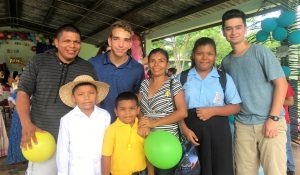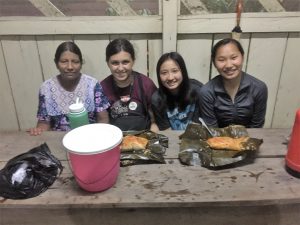The Homestay Experience
LIVING WITH A HOST FAMILY
 Homestays can be the most rewarding part of a Global Works trip! We have designed the homestay to be very student-friendly. A homestay experience is a valuable opportunity to improve your language skills by immersing yourself in a situation where communication in French or Spanish (depending on your program country) is a must! You will eat most of your meals with your family and sleep in their home. You will not be isolated with your
Homestays can be the most rewarding part of a Global Works trip! We have designed the homestay to be very student-friendly. A homestay experience is a valuable opportunity to improve your language skills by immersing yourself in a situation where communication in French or Spanish (depending on your program country) is a must! You will eat most of your meals with your family and sleep in their home. You will not be isolated with your  family as you will still be with the whole Global Works group during most days to work on projects or head out on excursions. On weekends, you will spend a majority of the time with your host family doing activities that they enjoy sharing with you. Many evenings, you will find yourself getting together with other students, your Trip Leaders, and the homestay families to participate in various social activities.
family as you will still be with the whole Global Works group during most days to work on projects or head out on excursions. On weekends, you will spend a majority of the time with your host family doing activities that they enjoy sharing with you. Many evenings, you will find yourself getting together with other students, your Trip Leaders, and the homestay families to participate in various social activities.
While there is no ‘typical’ homestay experience, many students will stay in touch with their families for years to come. One thing is certain- the homestay is bound to be the most wonderfully dramatic and memorable part of the trip. Each year, students reflect on their homestay as the best part of their trip – we hope you will, too!
THE VALUE OF HOMESTAYS
Enhanced language immersion
Most of our homestay families do NOT speak English, and staying in a homestay vastly improves language skills.
A more authentic travel experience
Experience first-hand customs, local holidays, home-cooked food, and general daily life. Families share their local knowledge and stories… this can’t be learned from a guidebook!
Feel closer to the community
Students attend celebrations, dances, sports events, potlucks, and festivals. Becoming a member of the family and community versus solely a guest or visitor forms lasting bonds and friendships for many years to come.
Growth in responsibility and maturity
Responsibilities, such as cooking, cleaning, and helping around the house, build personal growth and prepare students to live in group settings, such as at college or university.
FAQs REGARDING HOMESTAYS
This is a common question from parents and students. Homestay families are carefully selected through a standardized process of interviews, home visits, contractual agreements, and careful consideration. Safety is our primary consideration when selecting communities and families. In addition, we search for families who have the desire to partner with our groups in service work and cultural exchange. We follow the following steps when making this important selection:
STEP 1 – Make a Personal Connection: A Global Works director establishes a personal connection through a community member, typically a teacher, Peace Corps volunteer, or prior personal contact.
STEP 2 – Visit the Community: A Global Works director visits the community and assesses it based on our Homestay Community Protocols and Guidelines including, but not limited to: access to clean water for drinking and bathing, an interest in a cross-cultural exchange, a high standard of security and sanitation, and a local interest in prioritizing community development projects. It is also important that the community has a leader or committee that acts as the liaison with Global Works.
STEP 3 – Meet and Train the Families: A Global Works director meets all the families who are interested in hosting a Global Works student and visits them in their homes. They are screened based on our Homestay Family, Transportation, and Accommodations Guidelines. These guidelines assess the safety and security of the homes, that they have a private space for students, and that families agree with the expectations set forth by our Global Works Homestay agreement. We hold a training to instruct on safe food and water preparation, and also to answer any questions that they may have.
STEP 4- Pre-Trip Scouting: Within two weeks prior to the Global Works trip, a Global Works Trip Leader re-visits all homes to assure that they remain safe and secure. With the Global Works students’ Homestay Information forms in hand, the Trip Leader begins to think about host family matches.
STEP 5 – Post- Trip Evaluation: Two weeks after the Global Works trip, the Global Works Trip Leaders and Host Families complete the Homestay Evaluations to determine if Global Works students will return to each particular homestay in the future.
Yes. All of our families are carefully screened by a Global Works representative prior to allowing any participant to stay in a home. Both the family and living space are evaluated based on criteria designed to select the most appropriate homes and families for both a safe and meaningful experience. Families sign a contract with Global Works stating they have a clear understanding of our rules, guidelines, and expectations. We carefully consider and match students based on age, gender, and preferences to the extent it is possible.
Like any community in the United States, all of our communities are different from one another. The same goes for the families we choose. Typically, our communities, and subsequently the families, are in rustic settings where participants should expect conditions significantly different than their own home. The presence of a variety of animals and some insects is not out of the ordinary. Most families live in humble, but sanitary homes and are committed to providing a caring, secure environment for our students. Our communities are typically rural and feature a strong community spirit.
Our Global Works Trip Leaders determine the host family matches within the first couple days of this trip. Through this process, we are better able to appropriately pair students with one another and with the most appropriate homestay family. We find that this greatly increases the possibility of excellent matches. For this reason, participants will find out about their family while on their trip, not prior to the trip.
There are a number of factors that go into deciding who goes where. Global Works Trip Leaders determine the best match possible. The information we use includes (but is not limited to): allergies, diet, age, language proficiency, and personal preference. We do consider students wishes as far as having kids in the home, other teenagers, etc., but cannot always guarantee this will be available. Our first priority is to place each participant with a reputable, responsible, and warm family with an authentic interest in cultural exchange.
Students are with the entire group during most days to work on projects and participate in other activities. Local community members and children will be working and playing alongside the group. A typical day may be:
- 7:00am Breakfast with host families,
- 8:00am Group “Weather Check” meeting and/or language practice (for Language Immersion programs)
- 9:00am Service Projects
- 12:00pm Lunch with host families
- 1:00pm Continue Service Projects
- 3:00pm Soccer Game/ Break
- 5:00pm Dinner with host families
- 7:00pm Evening Activity such as a game night, sporting event, dance, or festival
No. Some of the children may have basic English at school, but the majority do not speak English. Remember, we have told each family that you are there to practice Spanish or French. Before arriving to the homestay, we will practice some key phrases in the target language as well as some other useful communication skills. Charades, anyone?!
Most students stay in paired homestays. However, we do offer students the option for an individual homestay, if requested.
Participants will know where their Global Works leaders are at all times and vice versa. Participants will have a map of the community and an Emergency Contact Card that has their leader’s cell phone number. If there is a problem in any home that warrants switching host families, we will organize a move. In addition, Global Works always has Emergency Action Plans for each location that we visit. Your Global Works leader will know where the closest medical facility is and the fastest way to reach it.
You may want to consider bringing a small “host” gift for your family. You will not find out the make-up of your host family a couple days into the trip, so plan on one “host” gift for the entire family or anticipate a host mom, dad and kids. If the makeup of your family is different than anticipated you will find other members of the community for your gift. We recommend that you bring something that represents your hometown or something that you like to do. For example, a book or calendar of photos, a card game, Frisbee, team t-shirts, or arts and crafts supplies. Consider your first night in the homestay and how the gift may help you “break the ice” with your host family.
Definitely! We encourage participants to write letters and emails and send photos to their homestay families after the trip. This is a wonderful way to stay connected to the host community. We will help you with this by emailing you homestay contact information once your trip is complete. Our homestay families especially love to receive mail from their “American son/daughter” during holiday times and birthdays!

